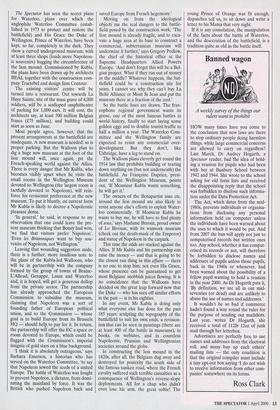Banned wagon
A weekly survey of the things our rulers want to prohibit
HOW many times have you come to the conclusion that new laws are there to stop ordinary people doing harmless things, while large commercial concerns are allowed to carry on regardless? Last March, Dr Audrey Hogarth, a Spectator reader, had the idea of hold- ing a reunion for pupils who had been with her at Banbury School between 1942 and 1944. She wrote to the school asking for old form lists and received the disappointing reply that the school was forbidden to disclose such informa- tion under the Data Protection Act.
The Act, which dates from the mid- 1980s, prevents individuals or organisa- tions from disclosing any personal information held on computer unless the individuals have been warned about the uses to which it would be put. And from 2007 the ban will apply not just to computerised records but written ones too. Any school, whether it has comput- erised its records or not, will therefore be forbidden to disclose names and addresses of pupils unless those pupils, back in the 1940s or whenever, had been warned about the possibility of a fellow pupil wanting to hold a reunion in the year 2000. As Dr Hogarth puts it, `By definition, we are all in our mid- seventies (or dead) and are unlikely to abuse the use of names and addresses.'
It wouldn't be so bad if commerce hadn't found a way round the rules for the purpose of sending out mailshots. Last year, writes Dr Hogarth, she received a total of 1121b 12oz of junk mail through her letterbox.
Advertisers are perfectly free to use names and addresses from the electoral roll, and many buy up each others' mailing lists — the only condition is that the original compiler must include a tiny opt-out box saying 'I do not wish to receive information from other com- panies' somewhere on its forms.
Ross Clark






















































































 Previous page
Previous page